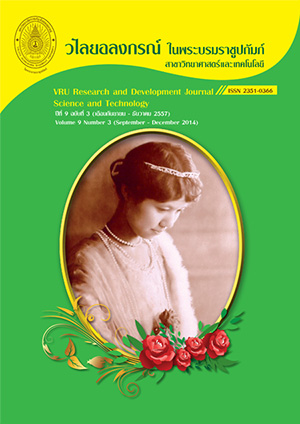การเปรียบเทียบผลการเรียนประเด็นปัญหาทางสังคมที่เกี่ยวข้องกับการใช้วิทยาศาสตร์ โดยใช้การเรียน แบบผสมผสานตามรูปแบบการเรียน Lin และ Mintzes และรูปแบบการเรียนวัฏจักรการเรียนรู้ 5 ขั้น ที่มีต่อความสามารถในการโต้แย้งและการคิดเชิงวิพากษ์วิจารณ์ของนักเรียนชั้นมัธ
Main Article Content
Abstract
This research aimed to compare effects of learning socioscientific issues using the mixed methods based on Lin and Mintzes method and the 5-E learning cycle approach on argumentation and critical thinking of 57 Mathayomsuksa 4 students with different physics learning outcomes in academic year of 2013 selected. using the multi - stage random sampling technique. Instruments for the research included 1) learning plans on 3 socioscientific issues : Line - Social Media Online of Modern Children, Alternative Energy from Cassava and Tree - Cutting for Dam Construction, 3 plans each and each plan for 3 hours of learning in a week; 2) argumentation tests and 3) the critical thinking test. The collected data were analyzed for testing hypotheses using the paired t – test and the F – test (Two – way MANCOVA and ANCOVA).
The results of the research revealed that the whole students, the high physics achievers and the low physics achievers who learned the socioscientific issues using the mixed methods based on the Lin and Mintzes method and the 5-E learning cycle approach showed developments of argumentation from the 1st to 4th test ; and showed gains in an entire critical thinking and in each of 4 subscales from before learning (p<.001). The high physics achievers indicated more argumentation abilities and an entire critical thinking abilities and in 2 subscales : credibility of data resource and observation and induction, than did the low physics achievers (p<.001). In addition, the experimental group 1 students evidenced more argumentation and an entire critical thinking abilities and only in the induction subscale than did the experimental group 2 students (p≤.018). Also statistical interactions of physics learning outcome with learning method on argumentation and entire critical thinking abilities and in 2 subscales : deduction and of identification of assumptions were found to be significant (p≤.032).Downloads
Article Details
Copyright Notice
The copyright of research articles published in the VRU Research and Development Journal Science and Technology Journal belongs to the Research and Development Institute, Valaya Alongkorn Rajabhat University under the Royal Patronage. Reproduction of the content, in whole or in part, is prohibited without prior written permission from the university.
Responsibility
The content published in the VRU Research and Development Journal Science and Technology Journal is the sole responsibility of the author(s). The journal does not assume responsibility for errors arising from the printing process.
References
จีระพรรณ สุขศรีงาม. (2536). ชีวสถิติเบื้องต้น (ฉบับปรับปรุง). คณะวิทยาศาสตร์มหาวิทยาลัยศรีนครินทร
วิโรฒ มหาสารคาม.
นันทิยา บุญเคลือบ. (2540). การเรียนการสอนวิทยาศาสตร์ตามแนวคิด Constructivism. สถาบันส่งเสริม
การสอนวิทยาศาสตร์และเทคโนโลยี. 25 (96) มกราคม – มีนาคม: 13-14.
นิกร จำปาหาร. (2555). การเปรียบเทียบผลการเรียนประเด็นปัญหาทางสังคมที่เกี่ยวข้องกับวิทยาศาสตร์โดย
ใช้รูปแบบผสมผสานและแบบปกติที่มีต่อความสามารถในการโต้แย้งและการคิดวิจารณญาณ
ของนักเรียนชั้นมัธยมศึกษาปีที่ 5 ที่มีแรงจูงใจใฝ่สัมฤทธิ์ทางการเรียนต่างกัน. วิทยานิพนธ์ กศ.ม.
มหาสารคาม : มหาวิทยาลัยมหาสารคาม,.
ประพันธ์พงษ์ ไชยจิตร. (2555). การเปรียบเทียบผลการเรียนประเด็นปัญหาทางสังคมที่เกี่ยวข้องกับการใช้
วิทยาศาสตร์โดยใช้รูปแบบการเรียนผสมผสานกับรูปแบบการเรียนปกติที่มีผลต่อความสามารถในการ
โต้แย้งและการคิดเชิงวิพากษ์วิจารณ์ของนักเรียนระดับชั้นมัธยมศึกษาปีที่ 6 ที่มีผลการเรียนฟิสิกส์
แตกต่างกัน. วิทยานิพนธ์ กศ.ม. มหาสารคาม : มหาวิทยาลัยมหสารคาม.
พัฒนวงศ์ ดอกไม้. (2555). การเปรียบเทียบผลการเรียนประเด็นปัญหาทางสังคมที่เกี่ยวข้องกับการใช้
วิทยาศาสตร์โดยใช้รูปแบบการเรียนผสมผสานกับรูปแบบการเรียนปกติที่มีต่อความสามารถในการ
โต้แย้งและการคิดเชิงเหตุผลของนักเรียนระดับชั้นมัธยมศึกษาปีที่ 5 ที่มีผลการเรียนฟิสิกส์แตกต่าง
กัน. วิทยานิพนธ์ กศ.ม. มหาสารคาม : มหาวิทยาลัยมหาสารคาม.
พรพรรณ พลเยี่ยม. (2555). การเปรียบเทียบผลการเรียนประเด็นปัญหาทางสังคมที่เกี่ยวข้องกับการใช้
วิทยาศาสตร์ โดยใช้รูปแบบการเรียนแบบผสมผสานกับแบบปกติ ที่มีต่อความสามารถในการโต้แย้ง
และการคิดเชิงวิพากษ์วิจารณ์ ของนักเรียนชั้นมัธยมศึกษาปีที่ 4 ที่มีเพศต่างกัน. วิทยานิพนธ์ กศ.ม.
มหาสารคาม : มหาวิทยาลัยมหสารคาม.
ไพฑูรย์ สุขศรีงาม. (2552). ความรอบรู้และความแตกฉานทางวิทยาศาสตร์ และเทคโนโลยี (Scientific and
Technological Literacy) เอกสารประกอบการสอนวิทยาศาสตร์ศึกษา. มหาสารคาม :
มหาวิทยาลัยมหาสารคาม.
________(2554). เอกสารแนะนำโปรแกรม SPSS ใน เอกสารประกอบรายวิชา 1601501 Statistic methods
For sciences and health sciences. หน้า 30-35. มหาสารคาม บัณฑิตวิทยาลัย มหาวิทยาลัย
มหาสารคาม
สถาบันส่งเสริมการสอนวิทยาศาสตร์และเทคโนโลยี. (2546). คู่มือการจัดการเรียนรู้กลุ่มสาระการเรียนรู้
วิทยาศาสตร์. กรุงเทพฯ : โรงพิมพ์คุรุสภาลาดพร้าว.
สุพรรณี สุวรรณจรัส. (2543). ผลการใช้เทคนิคแผนผังทางปัญญาที่มีต่อการคิดอย่างมีวิจารณญาณของนักเรียน
ชั้นมัธยมศึกษาปีที่ 2 . วิทยานิพนธ์ปริญญามหาบัณฑิต สาขาวิชาจิตวิทยาการศึกษา บัณฑิตวิทยาลัย
จุฬาลงกรณ์มหาวิทยาลัย.
สุกัญญา ประดิษฐ์แท่น. (2555). การเปรียบเทียบผลการเรียนประเด็นปัญหาทางสังคมที่เกี่ยวข้องกับการใช้
วิทยาศาสตร์ โดยใช้รูปแบบการเรียนผสมผสานกับรูปแบบการเรียนปกติที่มีต่อความสามารถในการ
โต้แย้ง และการคิดวิเคราะห์ ของนักเรียนชั้นมัธยมศึกษาปีที่ 3 ที่มีแรงจูงใจใฝ่สัมฤทธิ์ทางการเรียน
ต่างกัน. วิทยานิพนธ์ กศ.ม. มหาสารคาม : มหาวิทยาลัยมหาสารคาม.
วิชชนุนัย คณะมะ. (2556). การเปรียบเทียบผลการเรียนประเด็นปัญหาสังคมที่เกี่ยวข้องกับการใช้วิทยาศาสตร์
โดยใช้รูปแบบวิธีการทางวิทยาศาสตร์กับรูปแบบการเรียนปกติ ที่มีต่อความสามารถในการโต้แย้ง
และการคิดวิพากษ์วิจารณ์ของนักเรียนชั้นประถมศึกษาปีที่ 6 ที่มีผลการเรียนวิทยาศาสตร์ต่างกัน.
วิทยานิพนธ์ กศ.ม. มหาสารคาม : มหาวิทยาลัยมหาสารคาม.
อิสราภรณ์ พวงประโคน. (2556). การเปรียบเทียบผลการเรียนประเด็นปัญหาทางสังคมที่เกี่ยวข้องกับการใช้
วิทยาศาสตร์ โดยใช้การเรียนการสอนแบบผสมผสานตามวิธีการทางวิทยาศาสตร์กับการเรียนแบบ
ปกติที่มีต่อความสามารถในการโต้แย้งและการคิดวิพากษ์วิจารณ์ของนักเรียนชั้นมัธยมศึกษาปีที่ 3 ที่
มีผลการเรียนวิทยาศาสตร์ต่างกัน. วิทยานิพนธ์ กศ.ม มหาสารคาม : มหาวิทยาลัยมหาสารคาม.
Aikenhead, G. (1994). Consequences to Lerning Sciencc Through STS : A Research
Persepctive,” in STS Education : In ternational Perspective on Reform. Edited by
Solomon, J. and Aikenhead. G. 169-186. New York, USA : Teachers College Press,
Columbia University.
Ausubel, D. (1968). The Psyhology of Meaning Verbal Learing. New York : Grune and Stration.
Dawson, V.M. and Venville G. (2008). Teaching Stratergies for Developing
Students’Argumentation Skills about Socioscientific Issues in High School Genetics.
Research in Science Education. 38 (1): 67-90.
Ennis , R.H. , Millman, J. and Tomko, T.N. (1985). Cornell Critical ThinkingTest. Pacific Grove,CA
: Midwest.
Esposito, D. (1973). Homogenous and Heterogeneous Ability Grouping: Principal Findings and
Implications for Evaluating and Designing more Effective Educational Environments.
Review of Educational Research, 43, 165-166.
Lin, Shu-Sheng and Mintzes, J. J. (2010). Learning Argumentation Skills through Instruction in
Socioscientific Issues : The Effect of Ability Level. Taiwan : National Science Council,
-3.
Nuangchalerm, P . (2009). Development of Socioscientific Issues-Based Teaching for Preservice
Science Teachers, Journal of Social Sciences. 5(3): 239-243.
Piaget, J. (1964). Development and Learning, Dans : Piaget Rediscovered : A report of the
Conference on Cognitive Studies and Ithaca. NY : cornell University.
Pedretti, E. (1999). Decision Making and STS Education : Exploring Scientific Knowledge and
Social Responsibility in Schools and Science Center Through an Issues-Based
Approach. School Science and Mathematics 99(4): 174-181.
Reis, P. (2009). Teaching Controversial Socio Scientific Issue in Biology and Geology
Classes : A Case of Student ” Electronic Journal of Science Education. 13(1) : 1-24.
Sadler, T.D. (2002). Socioscientific Issue Research and Its Relevance for Science Education in
Paper Presented to Science Education Graduate Students at the University of South
Florida. (Online). Available :http://www.eric. ed.gov. [Accessed 10 August 2012].
Sadler, T.D. and Zeidler, D.L. (2003). Weighing in on Genetic Engineering and Morality :
Students Reveal their Ideas, Expectations, and Reservations. Paper Presented at the
Annual Meeting of the NationalAssociation for Research in Science Teaching.
Philadelphia, PA. March 23-26, (Online).Available: http://www.eric.ed.gov [Accessed
July 2011].


